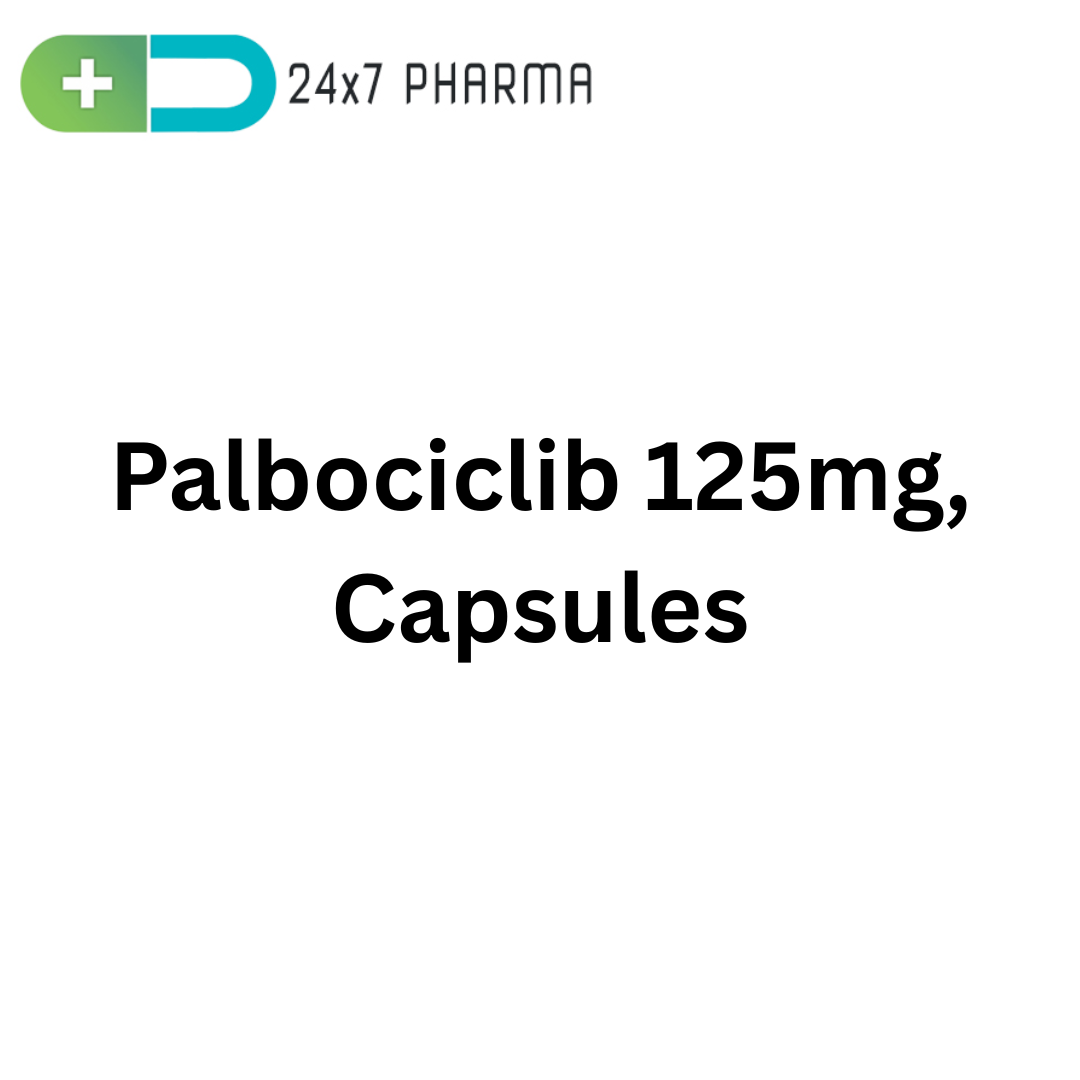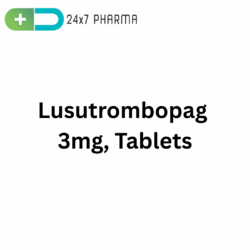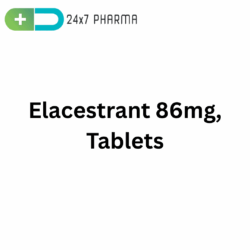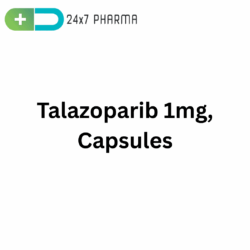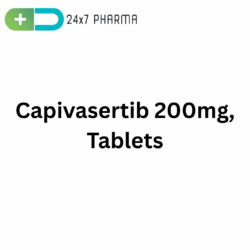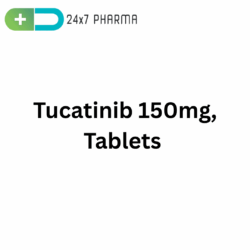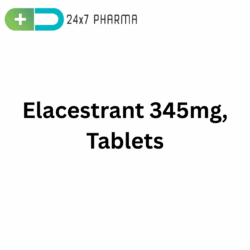LuciPalbo 125mg, Palbociclib Capsules
A targeted cancer medicine called LuciPalbo 125mg is used to treat particular kinds of breast cancer. Palbociclib, a selective cyclin-dependent kinase (CDK) 4 and 6 inhibitor, is its active medicinal ingredient. This oral therapy has transformed the landscape of treatment for hormone receptor-positive (HR+), human epidermal growth factor receptor 2-negative (HER2−) advanced or metastatic breast cancer. LuciPalbo is typically used in combination with endocrine therapies, such as letrozole or fulvestrant, to enhance treatment outcomes.
What is LuciPalbo 125mg?
Palbociclib, an antineoplastic agent categorized under CDK 4/6 inhibitors, is used in the formulation of the prescription drug LuciPalbo 125mg. By inhibiting proteins involved in cell division, it is used as part of combination therapy to halt the progression of breast cancer. Most frequently, postmenopausal women or men with advanced HR+/HER2− breast cancer are prescribed it.
How Does It Work / Mechanism of Action
Palbociclib works by selectively inhibiting cyclin-dependent kinases 4 and 6 (CDK4/6). These kinases are enzymes that regulate the cell cycle by facilitating progression from the G1 phase to the S phase, where DNA replication occurs. In HR+/HER2− breast cancer, the CDK4/6 pathway is often overactive, leading to uncontrolled cell proliferation.
By inhibiting CDK4/6, Palbociclib halts tumor cell growth and allows cancer cells to remain in a resting phase (G1), ultimately promoting cell death or senescence. When used alongside hormone therapies, which deprive the tumor of estrogen (a growth signal), LuciPalbo enhances the suppression of cancer progression.
How to Use / Indications
LuciPalbo 125mg is indicated for use in:
- HR+/HER2− advanced or metastatic breast cancer
- In combination with an aromatase inhibitor (e.g., letrozole) as initial endocrine-based therapy in postmenopausal women or men.
- during the course of fulvestrant in patients whose condition has progressed after endocrine therapy.
- It is not recommended as monotherapy and should always be administered under oncological supervision.
How to Take / Dosage
Standard Dosage:
- The typical recommended dose is 125 mg once daily for 21 consecutive days, followed by 7 days off treatment (28-day cycle).
- Since LuciPalbo is 100mg, a combination of 1 x 100mg + 1 x 25mg tablet is usually prescribed to reach the 125mg dose.
Administration:
- Take orally with food at approximately the same time each day.
- Swallow the tablet whole—do not crush, chew, or split.
- If a dose is missed or vomiting occurs, do not take an additional dose; wait until the next scheduled dose
Other Dosage Forms and Strengths
LuciPalbo (Palbociclib) is also available in other strengths:
- 75mg
- 125mg
These varying strengths allow personalized dose adjustments based on tolerability and side effects, especially for patients who experience hematologic toxicities or require dose reductions.
Side Effects
Like all cancer medications, LuciPalbo has a range of potential side effects, some of which may be serious. Common and serious side effects include:
Common:
- Neutropenia (low neutrophil count)
- Fatigue
- Nausea
- Diarrhea
- Hair thinning or loss (alopecia)
- Mouth sores
- Decreased appetite
Serious:
- Infections (due to low white blood cells)
- Pulmonary embolism
- Liver function abnormalities
- Severe neutropenia requiring hospitalization
- Regular blood tests are necessary to monitor blood counts, especially during the first few cycles.
Storage
- Store at room temperature (20°C to 25°C).
- Keep the tablets in the original blister pack to protect them from moisture.
- Do not use past
- Flexible Dosing: Available in multiple strengths for customized treatment plans.
Prescription Information
- LuciPalbo is a prescription-only medication.
- It should be prescribed by an oncologist or specialist in cancer treatment.
- Baseline and periodic complete blood counts (CBCs) are mandatory before and during treatment.
- Dose adjustments may be required based on side effects or lab results.
Drug Interactions
Palbociclib can interact with several other medications, especially those affecting liver enzymes:
Avoid with:
- Strong CYP3A inhibitors (e.g., ketoconazole, clarithromycin)
- Strong CYP3A inducers (e.g., rifampin, phenytoin, St. John’s Wort)
Other considerations:
- Grapefruit and grapefruit juice should be avoided as they may increase Palbociclib levels.
- Concomitant use with other myelosuppressive agents increases risk of low blood cell counts.
Always inform the healthcare provider about all medications, supplements, and herbal products being taken.
FAQs
Can men take LuciPalbo?
Yes, it is approve for use in both postmenopausal women and men.
What monitoring is require?
Regular blood counts to monitor neutropenia and liver function.
Is hair loss permanent?
Hair thinning is typically temporary and may reverse after treatment ends.
How long is the treatment course?
It varies depending on response and tolerability—may continue as long as effective.
Conclusion
LuciPalbo 125mg (Palbociclib) is a powerful and innovative therapy that plays a critical role in managing advanced HR+/HER2− breast cancer. By selectively targeting CDK4/6, it offers a more focused and effective approach to cancer control when paired with endocrine therapy. With a favorable safety profile and proven clinical benefit, it stands as a cornerstone in modern oncology. However, like all potent cancer treatments, it demands careful monitoring, medical supervision, and adherence to dosage guidelines for maximum benefit and minimal risk. Always consult your oncologist for tailored guidance before and during LuciPalbo therapy.

